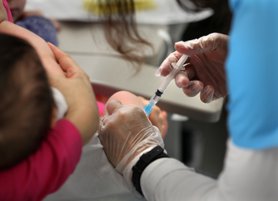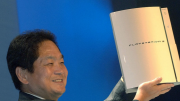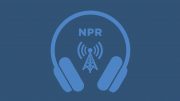A judge declined to immediately decide whether to suspend California’s nationally watched school vaccination law after a hearing Friday in downtown San Diego.
The courtroom session took place as the law, one of the toughest of its kind in the United States, is being rolled out for the first time with resumption of K-12 classes from Chula Vista to Los Angeles to San Francisco.
U.S. District Judge Dana Sabraw listened to a request from 17 families — including three in San Diego County — and two foundations seeking a preliminary injunction against Senate Bill 277, which the Legislature passed last year and whose main provision took effect on July 1.
photo
The law lists medical reasons as the only justification for doctors to grant children an exemption from the mandate that students in both public and private schools, as well as day-care facilities, be immunized. Religious and so-called “personal belief” considerations are no longer valid under state law.
“I understand the significance of the issue and how deeply held these personal beliefs are, and I will take that all into consideration when I issue a ruling,” Sabraw said. He added that his decision will likely be issued the week of Aug. 22.
The law resulted from a nationwide measles outbreak linked to a visitor or visitors at Disneyland in Anaheim. It requires kindergartners and seventh-graders to prove they have received the government’s recommended set of vaccinations.
Since the measure’s passage, experts in the public health, religious and legal arenas have debated whether it might fuel momentum for similar laws elsewhere. A few other states preceded California in banning immunization exemptions on a religious or “personal belief” basis, but California has often been a catalyst for national action on various issues over the decades.
At the moment, the lawsuit playing out in San Diego is perhaps the most prominent aspect of America’s long-running vaccination controversy.
Some parents remain skeptical of assurances from the medical community and public-health agencies that vaccines carry only a minuscule chance of adverse reactions. They believe the government should be more sensitive to young patients whose families have a history of chronic illness that they said increases vulnerability to bad side effects from vaccines.
For example, a major fear among anti-immunization advocates is that vaccines might cause autism. The topic gained renewed attention with the recent film “Vaxxed,” which a group of nearly two dozen parents who came to Friday’s hearing praised as showing that the government is lying about the true connection between vaccines and autism.
Public-health officials have been quick to respond to the film’s claims, calling them inaccurate and scientifically invalid. They also have continued to stress that too many vaccination exemptions will undermine the concept of “herd immunity,” in which the public gains overall immunity to targeted pathogens thanks to high rates of immunization over time.
Debates like these continue to play out on blogs, in online forums and via social media as SB 277 takes effect in schools.
In the San Diego region, several South County school districts have already returned from summer break. Some districts across the county will resume classes next week, and most local campuses will reopen by Labor Day.
Tanya Sutton of Chula Vista, from one of the three local families that joined the lawsuit against SB 277, said she has had trouble enrolling her son in kindergarten even though he received a medical exemption from a doctor for a condition she declined to specify.
Sutton said she hopes Sabraw will be persuaded by the plaintiffs’ presentation Friday.
“It’s a hardship. I’m a single parent and I can’t home-school my child,” Sutton said.
The lawsuit, filed on July 5, claims that SB 277 illegally infringes on the right of equal education guaranteed by state and federal laws. The state of California argues that public safety is paramount and education rights are not being violated because the affected children can be home-schooled as an alternative.
“On the contrary, (the new law) is intended to promote the right to an education of every child in California so that they can receive an education in a safe and healthy environment,” Jonathan Rich, lead attorney for the state’s Department of Justice, said Friday.
The state’s legal team also cited several vaccination cases elsewhere in which judges have ruled that states are not obligated to extend personal-belief exemptions to families.
Sabraw repeatedly focused on this point during the hearing, asking lawyers for the plaintiffs how they could insist that eliminating personal-belief exemptions violates students’ rights to education if case law in some states has found no requirement to offer them.
Kimberly Marie Mack Rosenberg, one of four attorneys who jointly filed the suit against California, said this case presents different circumstances. She said the state is shifting the government’s duty to provide a free and equal education onto parents. She also said SB 277 demonizes often healthy children simply because they object to vaccination due to their families’ medical history.
“They’re treating them as if they’re diseased children,” Mack Rosenberg said. She is part of a coalition — made up of law firms and advocacy groups focused on issues such as religious liberty, holistic health and individual choice — that was formed for this case.
Outside the court building, a small group of parents from throughout Southern California brought their children for an anti-vaccination rally.
Dene Schulze-Alva, a civil engineer and chiropractor, drove from Sierra Madre with her husband, Paul, and their daughters Sage and Sierra.
She said the family is following a vaccination schedule that’s slower than what the U.S. Centers for Disease Control and Prevention recommends because she is concerned about a repeat of the negative effects her stepdaughter suffered after immunization, including seizures.
She also said Sierra had an 18-month case of cyclical vomiting syndrome that occurred after the girl received a vaccination.
“We go to the doctors to say, ‘I’ve noticed this reaction’ and they say ‘Oh, it’s just a coincidence,” Schulze-Alva said.
She said those physicians have refused to grant a medical exemption for school based on her family’s customized vaccination schedule.
In Sacramento, the California Department of Education released a statement that said: “The department can’t comment on ongoing litigation, but Superintendent of Public Instruction Tom Torlakson strongly supports vaccination. It’s the law in California, and it’s the right thing to do for public health. Early reports indicate school districts are doing a great job of reminding parents that they need to submit vaccination records for students entering kindergarten and 7th grade.”
Source: www.sandiegouniontribune.com




